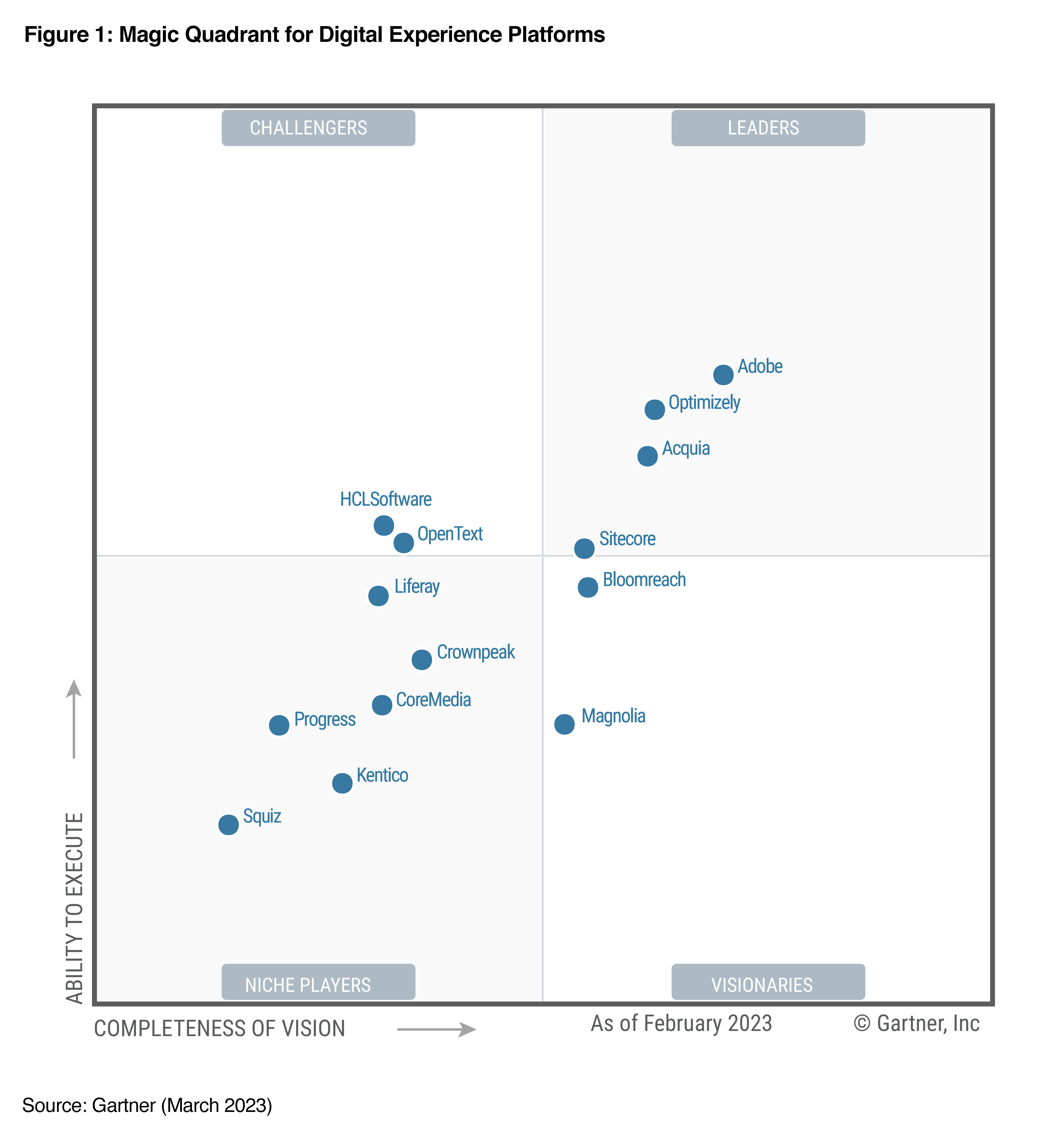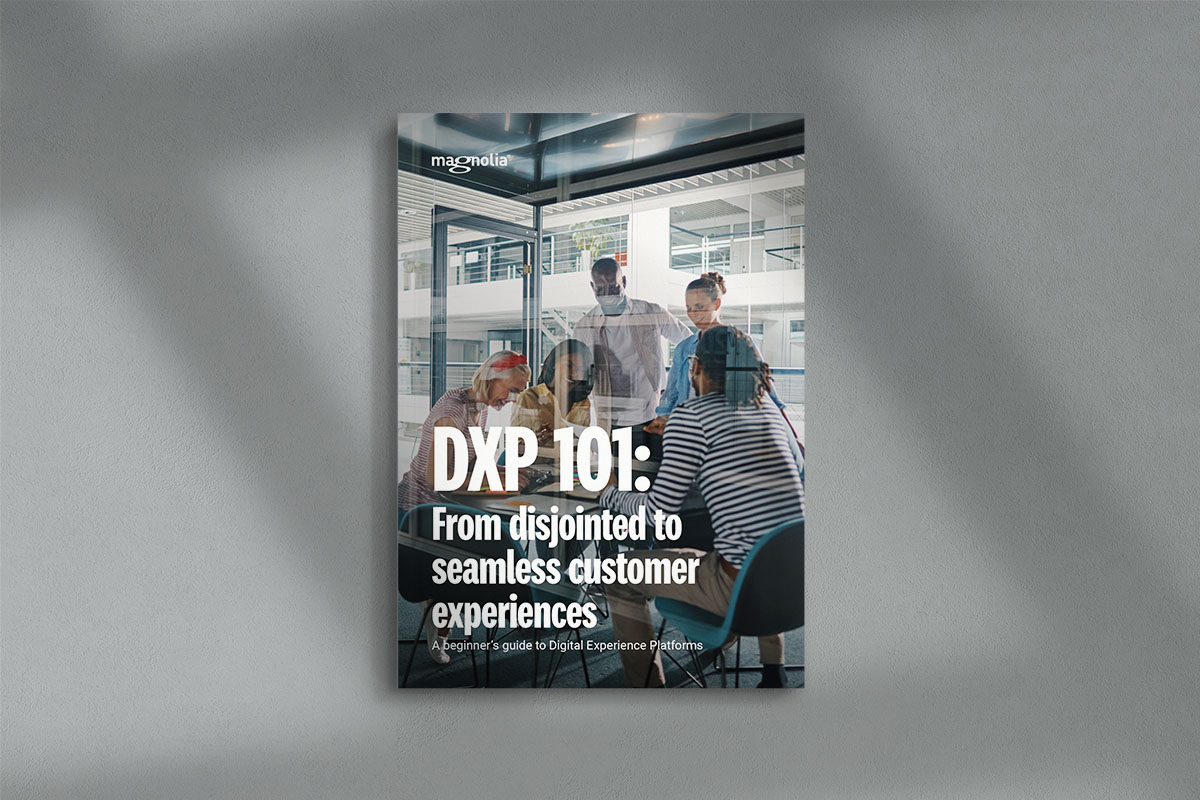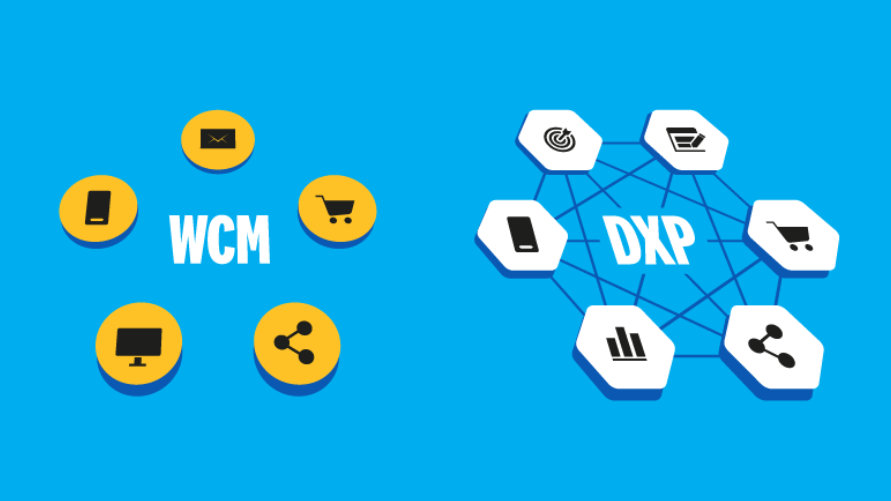Shifting from WCM to DXPs
Gartner retired this report category in 2020. The world of web content management (WCM) has evolved, and we're now in the era of digital experience platforms (DXPs).
Don't worry. Gartner still evaluates each platform's content management capabilities. DXPs like Magnolia offer a single platform for managing content and digital experiences. With a user-friendly, unified authoring interface, seamless integrations with adjacent technologies, and tools for personalization, analytics, optimization, and customer journey mapping, you can streamline your digital delivery to create exceptional digital experiences across multiple channels.
Let’s explore the shift from WCM to DXPs, emphasizing insights by Mike Lowndes, Irina Guseva, John Field, and Jim Murphy, analysts at Gartner, Inc. We will also uncover the key offerings that we believe have propelled Magnolia to be included in the analysts’ report.

What is a DXP?

A digital experience platform (DXP) is a software solution that enables you to create and manage your content, integrate systems, gain valuable insights, and deliver personalized digital experiences to your individual customers across various channels. With a DXP, you can ensure consistent branding, improve operational efficiency, gain customer loyalty, adapt to market changes and customer demands, and scale your digital presence.
Download our white paper DXP 101: From disjointed to seamless customer experiences as a beginner’s guide to Digital Experience Platforms.
By 2025, the global DXP market is anticipated to be valued at around $15.80 billion, according to industry projections. Digital experience strategies enable a remarkable 99% reduction in time to market, allowing businesses to deliver their offerings with unprecedented speed. In a survey by CMSWire, nearly 80% of digital experience executives emphasized the importance of exceptional customer experience for their organizations.
These insights highlight the profound impact of DXPs in facilitating faster market entry and personalized digital customer experiences — but how is this different from web content management?
Web content management (WCM) vs. digital experience platforms (DXPs)
WCM has long been crucial in helping businesses manage and publish their web content. It provided a way to organize, update, and present website information, ensuring a consistent online presence.
However, as the digital landscape evolved, businesses realized the need for a more comprehensive solution to deliver a broad range of exceptional digital experiences. This led to the emergence of DXPs, which build on the foundation of WCM and offer a more composable approach to content and commerce.

Here are some key differences between WCM and DXPs:
Scope – WCM primarily revolves around content creation, management, publishing, and simple personalization for websites. In contrast, DXPs offer a more comprehensive approach, incorporating content management systems, customer data management, advanced personalization, digital asset management, cloud capabilities, customer journey mapping, analytics, marketing automation, and multi-channel delivery to meet business goals and create engaging digital experiences.
Customer Experience Focus – Whereas WCM emphasizes managing content, DXPs prioritize customer journey management across multiple digital touchpoints. DXPs aim to create cohesive customer journeys and enable businesses to meet customer expectations at various stages of their interaction.
Personalization and Targeting – DXPs enable advanced personalization capabilities, leveraging customer data to deliver tailored experiences based on individual preferences, behaviors, and demographics. WCM may have limited personalization capabilities, mainly focused on simple rule-based targeting.
Omnichannel Experience – DXPs facilitate consistent and seamless experiences across a wide range of digital channels, including websites, mobile apps, customer portals, social media, email, and more. WCM typically focuses on website-centric experiences and often has limited support for other channels.
Gartner insights
Based on reviews on Gartner Peer Insights, Magnolia stands out with innovative digital experience capabilities and high customer support ratings, earning recommendations from more than 75% of respondents.
The reason for this success is not a mystery. Magnolia's core capabilities make it easy to set up a DXP and integrate the best tools. With an intuitive interface and user-friendly features, Magnolia supports your go-to-market strategies by enabling your digital marketing team to create captivating digital content and deliver personalized experiences.
According to Gartner, a significant majority — approximately 85% — of your effort and investment in a DXP program will be focused on integrating internal and external systems. With its Connector Packs and APIs, Magnolia extends natively into other core technologies that make up your composable DXP, reducing the complexity, effort, and time required for setup. As a result, the cost of integration is significantly minimized.
In Gartner's 2023 Magic Quadrant Report, Magnolia was recognized for the 3rd year in a row. We think we’ve been acknowledged as a visionary for our open, modular architecture, a unified approach to integrations, and our enterprise-grade editorial capabilities.
The value of the DXP
DXPs are essential tools that empower you to transform fragmented customer experiences into seamless, engaging journeys. By leveraging the insights provided by Gartner and choosing leading DXPs like Magnolia, you can enhance your digital strategies, improve customer engagement, and deliver exceptional experiences across all digital channels to match your and your customers’ unique needs.
Preguntas frecuentes
¿Quién es Gartner?
Gartner, Inc. ofrece a los ejecutivos y a sus equipos una visión objetiva y práctica.
Los expertos de Gartner, Inc.
¿Qué es un Cuadrante Mágico?
Según Gartner, “Un Cuadrante Mágico proporciona un posicionamiento competitivo gráfico de cuatro tipos de proveedores de tecnología, en mercados donde el crecimiento es alto, y la diferenciación de los proveedores es clara.”
Cada año, Gartner publica su Cuadrante Mágico para Plataformas de Experiencia Digital (DXP), un informe que evalúa las principales DXP del mercado.
El Cuadrante Mágico de Gartner es un informe que evalúa las principales DXP del mercado.
¿Qué es un DXP?
Según Gartner, “Una plataforma de experiencia digital (DXP) es un conjunto bien integrado y cohesionado de tecnologías diseñadas para permitir la composición, gestión, entrega y optimización de experiencias digitales contextualizadas a lo largo de recorridos multiexperiencia del cliente.
Un DXP puede proporcionar experiencias digitales óptimas a una variedad de constituyentes, incluidos consumidores, socios, empleados, ciudadanos y estudiantes, y ayudar a garantizar la continuidad a lo largo de todo el recorrido de vida del cliente. Proporciona la orquestación de la presentación que une las capacidades de múltiples aplicaciones para formar experiencias digitales sin fisuras.
Un DXP forma parte de un ecosistema empresarial digital a través de integraciones basadas en API con tecnologías adyacentes. Los DXP son aplicables a casos de uso de empresa a consumidor (B2C), empresa a empresa (B2B) y empresa a empleado (B2E).
¿Qué significa componibilidad?
Pensamos que un DXP componible funciona como la columna vertebral de su contenido digital. Puede adaptarlo a sus procesos e infraestructuras existentes. Las API y integraciones DXP se convierten en sus bloques de construcción para que pueda ofrecer una experiencia digital tan rápido como su audiencia lo necesite.
La componibilidad en DXP significa que puede reunir toda su pila de marketing, incluida la gestión de contenidos, la automatización del marketing, el comercio electrónico, la personalización y los análisis. En lugar de tener que pensar en todas estas herramientas como entidades separadas, pueden verse como un grupo de socios de DXP. Este único punto de acceso facilita la conexión con sus clientes de una forma más inteligente.
Más información
Acerca del informe
Título: 2023 Cuadrante Mágico de Gartner para plataformas de experiencia digital
Analistas: Irina Guseva, John Field, Mike Lowndes, y Jim Murphy
Publicado: 14 de marzo de 2023
Descargo de responsabilidad
Gartner no respalda a ningún proveedor, producto o servicio descrito en sus publicaciones de investigación, y no aconseja a los usuarios de tecnología que seleccionen únicamente a aquellos proveedores con las calificaciones más altas u otra designación. Las publicaciones de investigación de Gartner consisten en las opiniones de la organización de investigación de Gartner y no deben interpretarse como declaraciones de hecho. Gartner rechaza toda garantía, expresa o implícita, con respecto a esta investigación, incluyendo cualquier garantía de comerciabilidad o idoneidad para un propósito particular.
Las publicaciones de investigación de Gartner consisten en opiniones de la organización de investigación de Gartner y no deben interpretarse como declaraciones de hecho.
Este gráfico ha sido publicado por Gartner, Inc. como parte de un documento de investigación más amplio y debe evaluarse en el contexto del documento completo. El documento de Gartner está disponible previa solicitud a Magnolia.
GARTNER es una marca registrada y una marca de servicio de Gartner y Magic Quadrant es una marca registrada de Gartner, Inc. y/o sus filiales en EE.UU. e internacionalmente y se utilizan aquí con permiso. Todos los derechos reservados.

